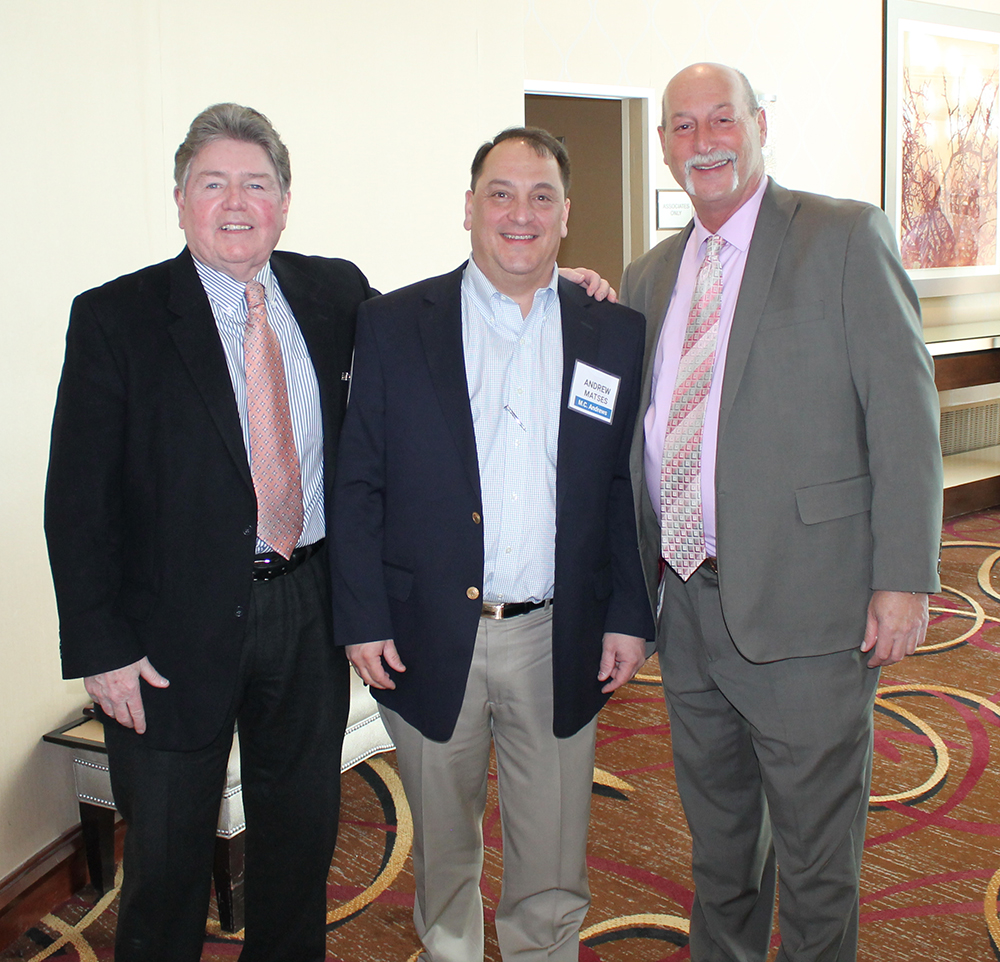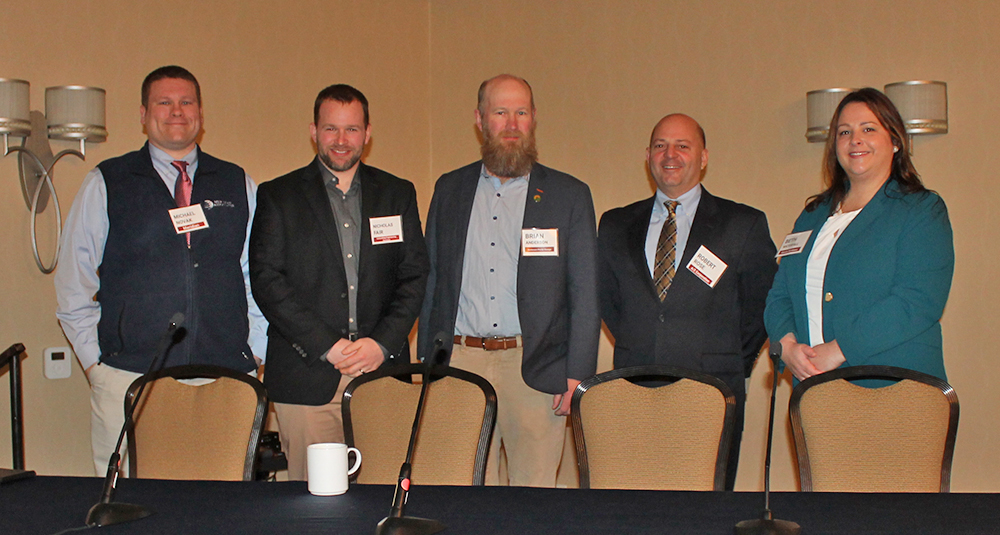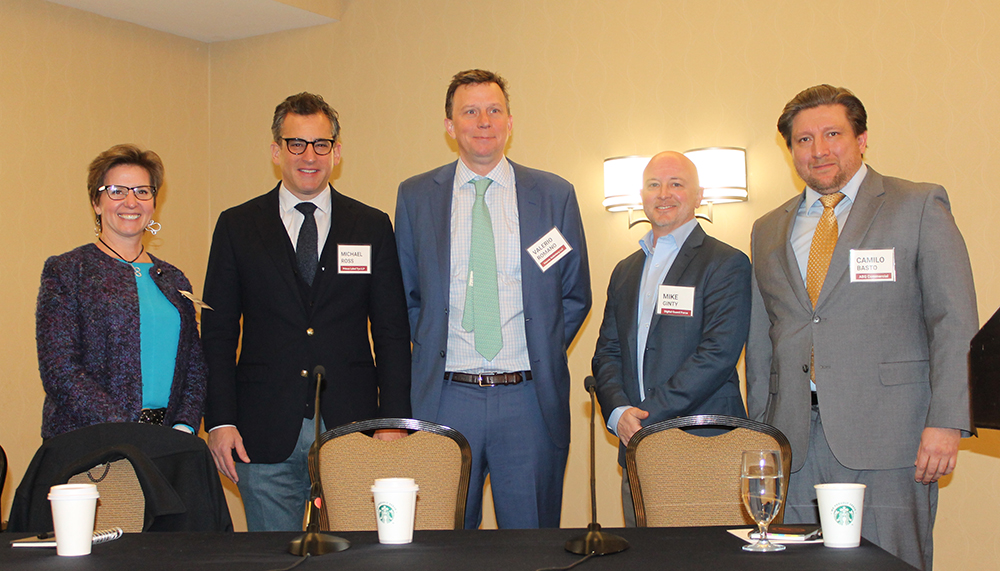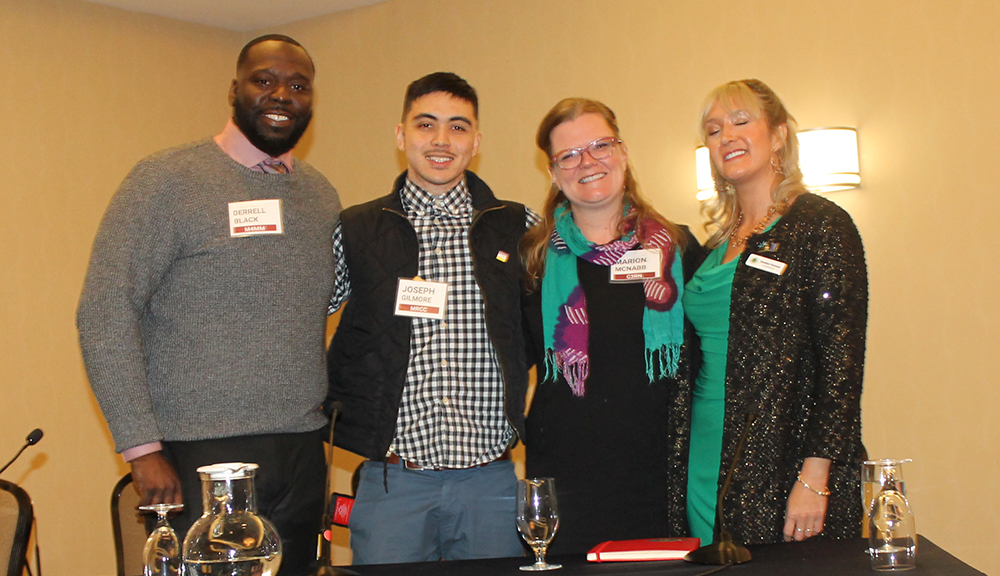
and Rick Kaplan of the New England Real Estate Journal.
Needham, MA Over 250 people braved the cold for the 3rd annual Cannabis Summit by The New England Real Estate Journal at the Sheraton Needham on March 7th.
The first panel was held from 8:30 – 9: 30 a.m. and was moderated by Beth Waterfall of ELEVATE Northeast. Topics included design solutions for retail and medical dispensaries, growing facilities and testing labs. Other speakers included: Brian Anderson of Anderson Porter Design; Nicholas Fair of Consulting Engineering Services; Robert Rose of A/Z Corp.; and Michael Novak of Meridian Associates.

of Consulting Engineering Services; Brian Anderson of Anderson Porter Design;
Robert Rose of A/Z Corp.; and Beth Waterfall of ELEVATE Northeast.
There were discussions on site challenges, to which Novak pointed out issues such as getting enough power, or if it is a retrofit, will there be enough parking.
Fair spoke about commissioning, and if you realize there is a problem you want an insurance policy on the facility. Rose agreed regarding 3rd party commissioning that gives you extra eyes on the development project itself.
There was talk about energy usage and how the cost of power needs to factor in your site selection. Rose commented by saying gas is a better alternative leading to sustainability and a low carbon footprint.
Anderson brought up how the industry hasn’t normalized yet, and it will help when the FDA provides guidelines to help growers and manufacturers.
Asked about predictions for the future, Novak said that once it is normalized, it will be steady. Fair commented on how over 60% of consumption is non-flower now. It is mostly oils, so there will be a wider acceptance in the future with more regulatory oversight.

Michael Ross of Prince Lobel; Valerio Romano of Vicente Sederberg;
Mike Ginty of Digital Guard Force; and Camilo Basto of ABG Commercial Real Estate.
The second panel was held from 9:30 – 10:30 a.m. and was moderated by Camilo Basto of ABG Commercial Real Estate. Topics included real estate investments in the cannabis industry, security, zoning, permitting and insurance issues. Other speakers included: Michael Ross of Prince Lobel; Mike Ginty of Digital Guard Force; Valerio Romano of Vicente Sederberg; and Kelly Pappas of Foster Sullivan Insurance.
The panel was asked about zoning and Romano mentioned how originally, zoning was industrial, and now it is moving to more commercial and retail. “There is a lot of opportunity here for one to invest in real estate without actually ever touching the plant, and really turning your regular industrial building into something that can have a lot more value,” said Romano.
Ross explained how it is becoming much harder to find locations, but the rewards are still there.
There was a lot of discussion on security. Pappas spoke about the insurance side of the topic and mentioned how landlords and property owners need to make sure the Criminal Act Exclusion Clause is covered in the event of a loss by the tenant. “Theft is one of the major concerns that insurance carriers have, it’s a cash business, so being able to show to the underwriter of the carrier that you have this amazing security program in place is going to be crucial in the application process,” said Pappas. Other insurance issues include liability and chance of explosions.
Ginty said, “Having not only cameras and alarms, and maybe a security guard, it’s really important to have those internal controls and fully developed plans and policies in place, as well as monitoring.” He also brought up how owners should make sure their cameras have forensic capability.

Marion McNabb of C3RN; and Heather Parsons of Keller Williams.
The third panel was held from 10:30 – 11:30 a.m. and was moderated by Heather Parsons of Keller Williams. Topics included cannabis businesses in disproportionate communities and marijuana business and the general public. Other speakers included: Marion McNabb of C3RN; Joseph Gilmore of MRCC; and Derrell Black of M4MM.
Parsons asked the panel how cities can embrace cannabis. McNabb mentioned how communities need to understand more about cannabis by providing date, facts and the medical value. Gilmore brought up how educational events are important for municipalities. According to Black, it is important to connect with neighborhood leaders, such as churches.
“The community should be an integral component when you are trying to acquire a cannabis license. If you can get people to these important association meetings, you can affect different things like where the zoning is going to be allowed, or if cannabis is going to even be allowed in the town in general,” said Gilmore.
“We need to all come together as nonprofit organizations and real estate agencies, and try to get more educational buildings up, such as community centers in disproportionate areas, so people, neighborhood leaders and the older people will know the pros, not just the cons about cannabis. We can teach them about the medical perks, and we can get people off of pills and injections and try to see if they can follow the cannabis route,” said Black.
On the subject of what people can do to make the industry more inclusive for disproportionate communities, McNabb spoke about the Cannabis Control Commission’s (CCC) Social Equity Program, which would ensure their inclusion.
The New England Real Estate Journal would like to thank the following sponsors for this event:
Gold Sponsor: CATIC National Commercial Services.
Corporate Sponsors: Elevate Northeast; Vantage Builders, Inc.; A/Z Corp.; CES; M.C. Andrews Co., Inc.; Foster Sullivan Insurance; Prince Lobel; ABG; Meridian Associates; and Digital Guard Force.
Vendor Sponsors: Anderson Porter Design; U.S. Pavement Services, Inc.; and Inspired Technology and Communications, LLC.
Media Sponsor: Sensi Magazine.
Please join NEREJ at its next summit – Nashua/Manchester/Bedford, New Hampshire – on August 25th at the Event Center at the Courtyard by Marriott Nashua, 2200 Southwood Dr., Nashua, N.H.
For more information or speaking/sponsor opportunities, please contact Rick Kaplan at rkaplan@nerej.com or call 781-878-4540.








